Analyzing Contract Law: Company Liabilities and Partnerships
VerifiedAdded on 2023/06/07
|8
|2535
|262
Case Study
AI Summary
This case study delves into two distinct legal scenarios concerning breach of contract. The first scenario examines whether Thor Mining Machinery Limited and Volvo Trucks (Australia) Ltd can sue Steve Jones for breach of contract, focusing on pre-registration contracts and the separate legal entity principle under Australian law. It concludes that Thor can sue Steve personally due to the non-ratification of a pre-incorporation contract, while Volvo can only sue WA Gold Exploration Ltd, as the contract was established post-incorporation. The second scenario addresses whether contracts between Simon (representing Computer Solutions) and Sunstar Computer Hardware Limited and You Beaut UTE Ltd are binding on Computer Solutions. It applies the Rule of Indoor Management, concluding that both contracts are binding; the former due to the potential good faith reliance of Sunstar, and the latter because Simon acted within his authorized contractual limit.
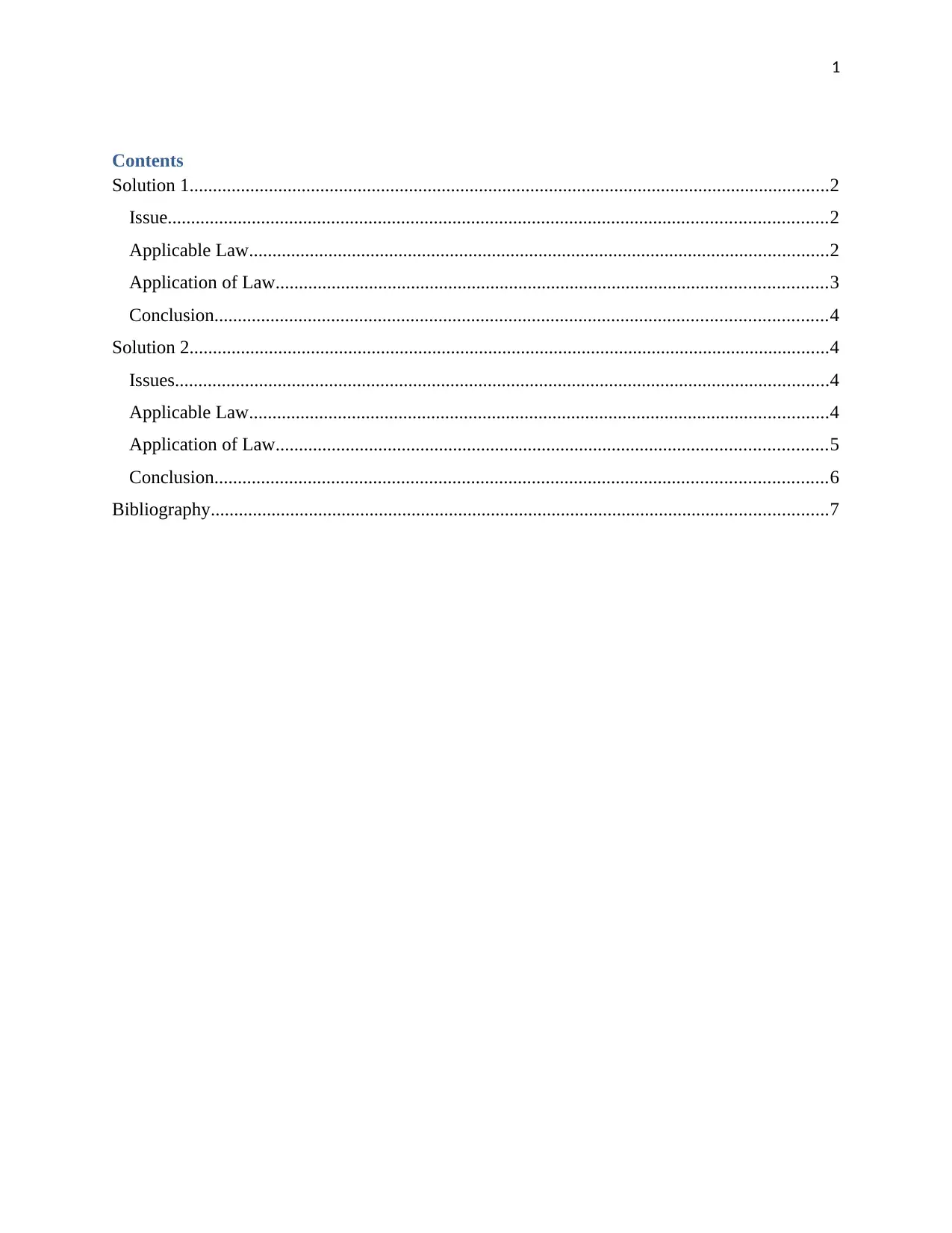
1
Contents
Solution 1.........................................................................................................................................2
Issue.............................................................................................................................................2
Applicable Law............................................................................................................................2
Application of Law......................................................................................................................3
Conclusion...................................................................................................................................4
Solution 2.........................................................................................................................................4
Issues............................................................................................................................................4
Applicable Law............................................................................................................................4
Application of Law......................................................................................................................5
Conclusion...................................................................................................................................6
Bibliography....................................................................................................................................7
Contents
Solution 1.........................................................................................................................................2
Issue.............................................................................................................................................2
Applicable Law............................................................................................................................2
Application of Law......................................................................................................................3
Conclusion...................................................................................................................................4
Solution 2.........................................................................................................................................4
Issues............................................................................................................................................4
Applicable Law............................................................................................................................4
Application of Law......................................................................................................................5
Conclusion...................................................................................................................................6
Bibliography....................................................................................................................................7
Paraphrase This Document
Need a fresh take? Get an instant paraphrase of this document with our AI Paraphraser
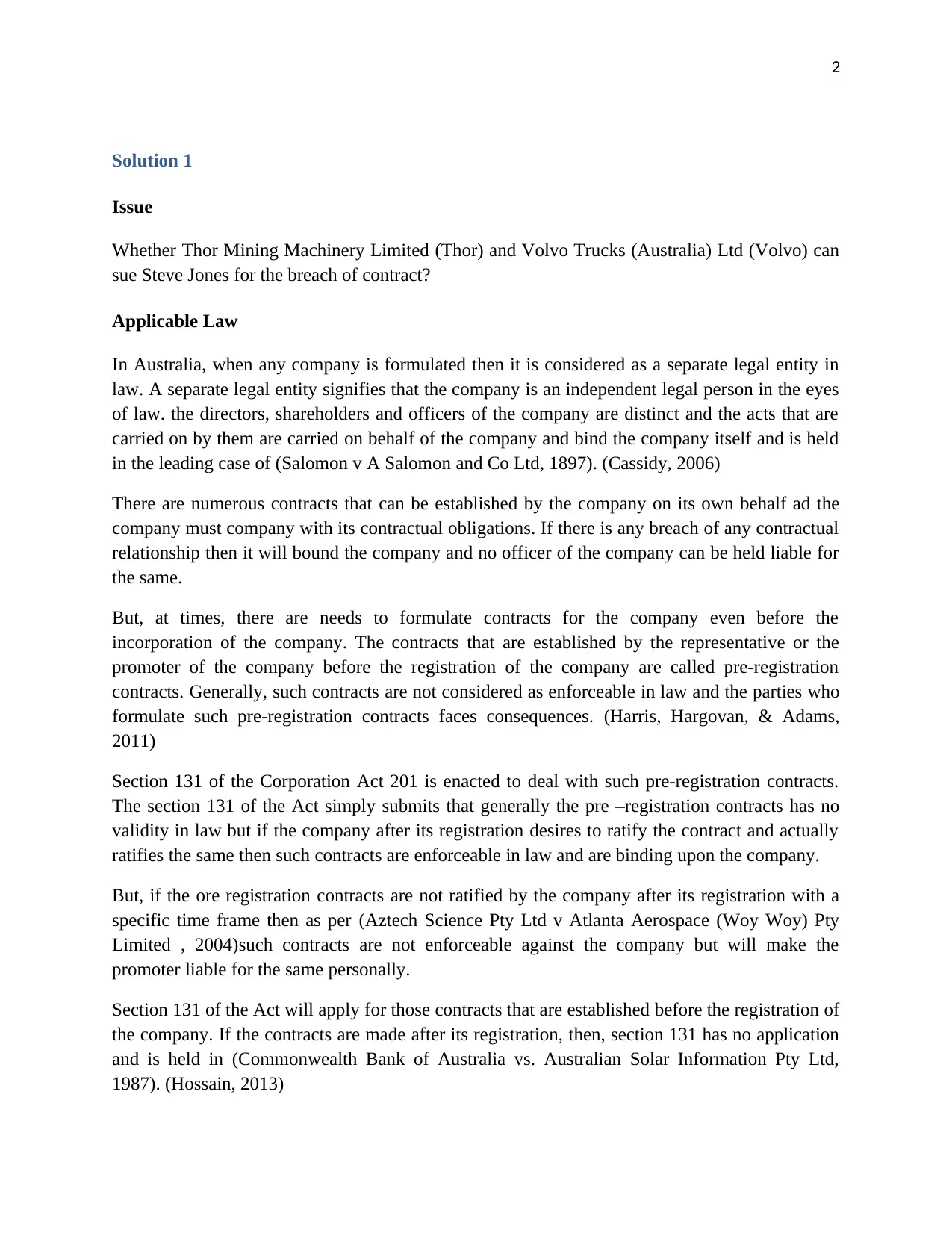
2
Solution 1
Issue
Whether Thor Mining Machinery Limited (Thor) and Volvo Trucks (Australia) Ltd (Volvo) can
sue Steve Jones for the breach of contract?
Applicable Law
In Australia, when any company is formulated then it is considered as a separate legal entity in
law. A separate legal entity signifies that the company is an independent legal person in the eyes
of law. the directors, shareholders and officers of the company are distinct and the acts that are
carried on by them are carried on behalf of the company and bind the company itself and is held
in the leading case of (Salomon v A Salomon and Co Ltd, 1897). (Cassidy, 2006)
There are numerous contracts that can be established by the company on its own behalf ad the
company must company with its contractual obligations. If there is any breach of any contractual
relationship then it will bound the company and no officer of the company can be held liable for
the same.
But, at times, there are needs to formulate contracts for the company even before the
incorporation of the company. The contracts that are established by the representative or the
promoter of the company before the registration of the company are called pre-registration
contracts. Generally, such contracts are not considered as enforceable in law and the parties who
formulate such pre-registration contracts faces consequences. (Harris, Hargovan, & Adams,
2011)
Section 131 of the Corporation Act 201 is enacted to deal with such pre-registration contracts.
The section 131 of the Act simply submits that generally the pre –registration contracts has no
validity in law but if the company after its registration desires to ratify the contract and actually
ratifies the same then such contracts are enforceable in law and are binding upon the company.
But, if the ore registration contracts are not ratified by the company after its registration with a
specific time frame then as per (Aztech Science Pty Ltd v Atlanta Aerospace (Woy Woy) Pty
Limited , 2004)such contracts are not enforceable against the company but will make the
promoter liable for the same personally.
Section 131 of the Act will apply for those contracts that are established before the registration of
the company. If the contracts are made after its registration, then, section 131 has no application
and is held in (Commonwealth Bank of Australia vs. Australian Solar Information Pty Ltd,
1987). (Hossain, 2013)
Solution 1
Issue
Whether Thor Mining Machinery Limited (Thor) and Volvo Trucks (Australia) Ltd (Volvo) can
sue Steve Jones for the breach of contract?
Applicable Law
In Australia, when any company is formulated then it is considered as a separate legal entity in
law. A separate legal entity signifies that the company is an independent legal person in the eyes
of law. the directors, shareholders and officers of the company are distinct and the acts that are
carried on by them are carried on behalf of the company and bind the company itself and is held
in the leading case of (Salomon v A Salomon and Co Ltd, 1897). (Cassidy, 2006)
There are numerous contracts that can be established by the company on its own behalf ad the
company must company with its contractual obligations. If there is any breach of any contractual
relationship then it will bound the company and no officer of the company can be held liable for
the same.
But, at times, there are needs to formulate contracts for the company even before the
incorporation of the company. The contracts that are established by the representative or the
promoter of the company before the registration of the company are called pre-registration
contracts. Generally, such contracts are not considered as enforceable in law and the parties who
formulate such pre-registration contracts faces consequences. (Harris, Hargovan, & Adams,
2011)
Section 131 of the Corporation Act 201 is enacted to deal with such pre-registration contracts.
The section 131 of the Act simply submits that generally the pre –registration contracts has no
validity in law but if the company after its registration desires to ratify the contract and actually
ratifies the same then such contracts are enforceable in law and are binding upon the company.
But, if the ore registration contracts are not ratified by the company after its registration with a
specific time frame then as per (Aztech Science Pty Ltd v Atlanta Aerospace (Woy Woy) Pty
Limited , 2004)such contracts are not enforceable against the company but will make the
promoter liable for the same personally.
Section 131 of the Act will apply for those contracts that are established before the registration of
the company. If the contracts are made after its registration, then, section 131 has no application
and is held in (Commonwealth Bank of Australia vs. Australian Solar Information Pty Ltd,
1987). (Hossain, 2013)
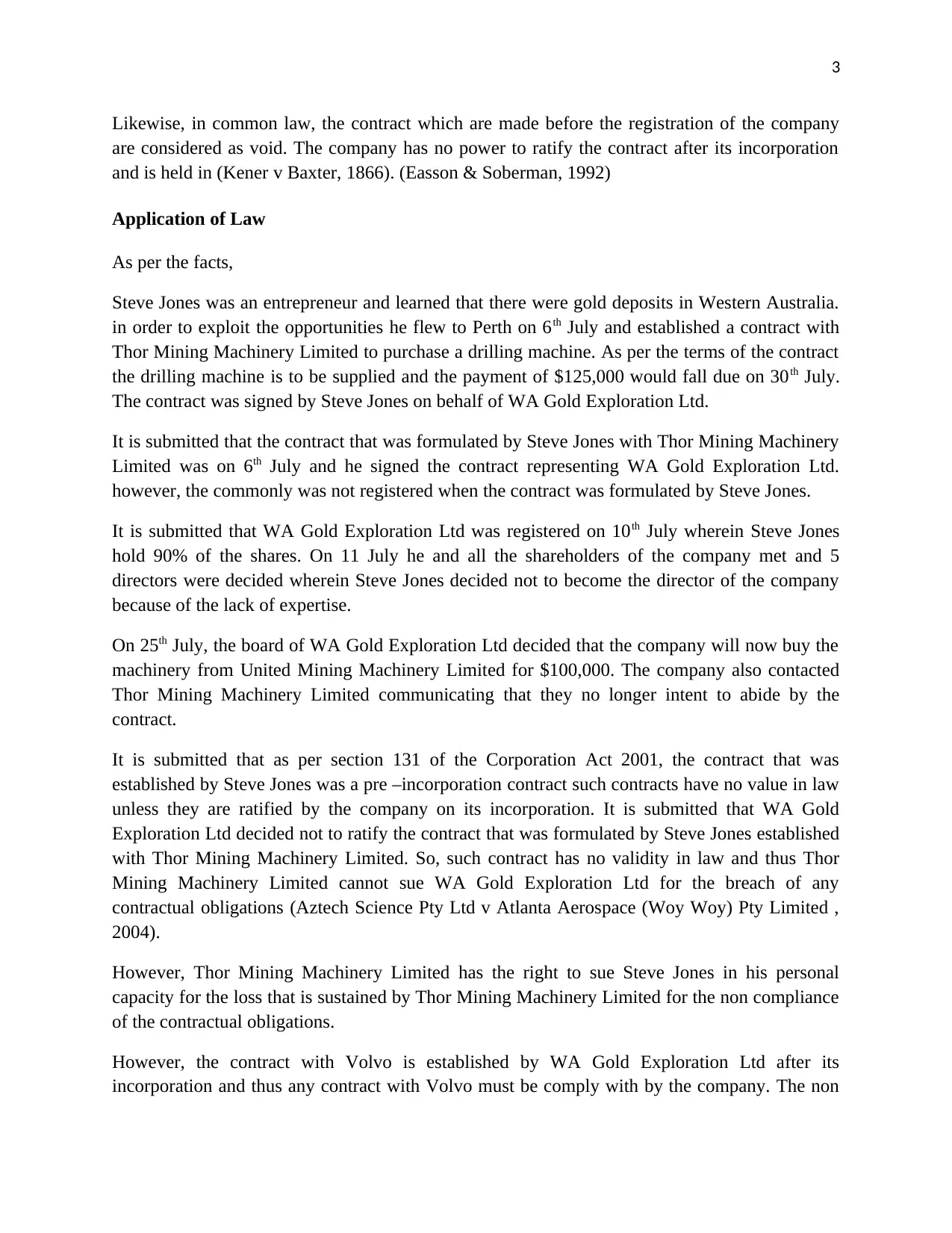
3
Likewise, in common law, the contract which are made before the registration of the company
are considered as void. The company has no power to ratify the contract after its incorporation
and is held in (Kener v Baxter, 1866). (Easson & Soberman, 1992)
Application of Law
As per the facts,
Steve Jones was an entrepreneur and learned that there were gold deposits in Western Australia.
in order to exploit the opportunities he flew to Perth on 6th July and established a contract with
Thor Mining Machinery Limited to purchase a drilling machine. As per the terms of the contract
the drilling machine is to be supplied and the payment of $125,000 would fall due on 30th July.
The contract was signed by Steve Jones on behalf of WA Gold Exploration Ltd.
It is submitted that the contract that was formulated by Steve Jones with Thor Mining Machinery
Limited was on 6th July and he signed the contract representing WA Gold Exploration Ltd.
however, the commonly was not registered when the contract was formulated by Steve Jones.
It is submitted that WA Gold Exploration Ltd was registered on 10th July wherein Steve Jones
hold 90% of the shares. On 11 July he and all the shareholders of the company met and 5
directors were decided wherein Steve Jones decided not to become the director of the company
because of the lack of expertise.
On 25th July, the board of WA Gold Exploration Ltd decided that the company will now buy the
machinery from United Mining Machinery Limited for $100,000. The company also contacted
Thor Mining Machinery Limited communicating that they no longer intent to abide by the
contract.
It is submitted that as per section 131 of the Corporation Act 2001, the contract that was
established by Steve Jones was a pre –incorporation contract such contracts have no value in law
unless they are ratified by the company on its incorporation. It is submitted that WA Gold
Exploration Ltd decided not to ratify the contract that was formulated by Steve Jones established
with Thor Mining Machinery Limited. So, such contract has no validity in law and thus Thor
Mining Machinery Limited cannot sue WA Gold Exploration Ltd for the breach of any
contractual obligations (Aztech Science Pty Ltd v Atlanta Aerospace (Woy Woy) Pty Limited ,
2004).
However, Thor Mining Machinery Limited has the right to sue Steve Jones in his personal
capacity for the loss that is sustained by Thor Mining Machinery Limited for the non compliance
of the contractual obligations.
However, the contract with Volvo is established by WA Gold Exploration Ltd after its
incorporation and thus any contract with Volvo must be comply with by the company. The non
Likewise, in common law, the contract which are made before the registration of the company
are considered as void. The company has no power to ratify the contract after its incorporation
and is held in (Kener v Baxter, 1866). (Easson & Soberman, 1992)
Application of Law
As per the facts,
Steve Jones was an entrepreneur and learned that there were gold deposits in Western Australia.
in order to exploit the opportunities he flew to Perth on 6th July and established a contract with
Thor Mining Machinery Limited to purchase a drilling machine. As per the terms of the contract
the drilling machine is to be supplied and the payment of $125,000 would fall due on 30th July.
The contract was signed by Steve Jones on behalf of WA Gold Exploration Ltd.
It is submitted that the contract that was formulated by Steve Jones with Thor Mining Machinery
Limited was on 6th July and he signed the contract representing WA Gold Exploration Ltd.
however, the commonly was not registered when the contract was formulated by Steve Jones.
It is submitted that WA Gold Exploration Ltd was registered on 10th July wherein Steve Jones
hold 90% of the shares. On 11 July he and all the shareholders of the company met and 5
directors were decided wherein Steve Jones decided not to become the director of the company
because of the lack of expertise.
On 25th July, the board of WA Gold Exploration Ltd decided that the company will now buy the
machinery from United Mining Machinery Limited for $100,000. The company also contacted
Thor Mining Machinery Limited communicating that they no longer intent to abide by the
contract.
It is submitted that as per section 131 of the Corporation Act 2001, the contract that was
established by Steve Jones was a pre –incorporation contract such contracts have no value in law
unless they are ratified by the company on its incorporation. It is submitted that WA Gold
Exploration Ltd decided not to ratify the contract that was formulated by Steve Jones established
with Thor Mining Machinery Limited. So, such contract has no validity in law and thus Thor
Mining Machinery Limited cannot sue WA Gold Exploration Ltd for the breach of any
contractual obligations (Aztech Science Pty Ltd v Atlanta Aerospace (Woy Woy) Pty Limited ,
2004).
However, Thor Mining Machinery Limited has the right to sue Steve Jones in his personal
capacity for the loss that is sustained by Thor Mining Machinery Limited for the non compliance
of the contractual obligations.
However, the contract with Volvo is established by WA Gold Exploration Ltd after its
incorporation and thus any contract with Volvo must be comply with by the company. The non
⊘ This is a preview!⊘
Do you want full access?
Subscribe today to unlock all pages.

Trusted by 1+ million students worldwide
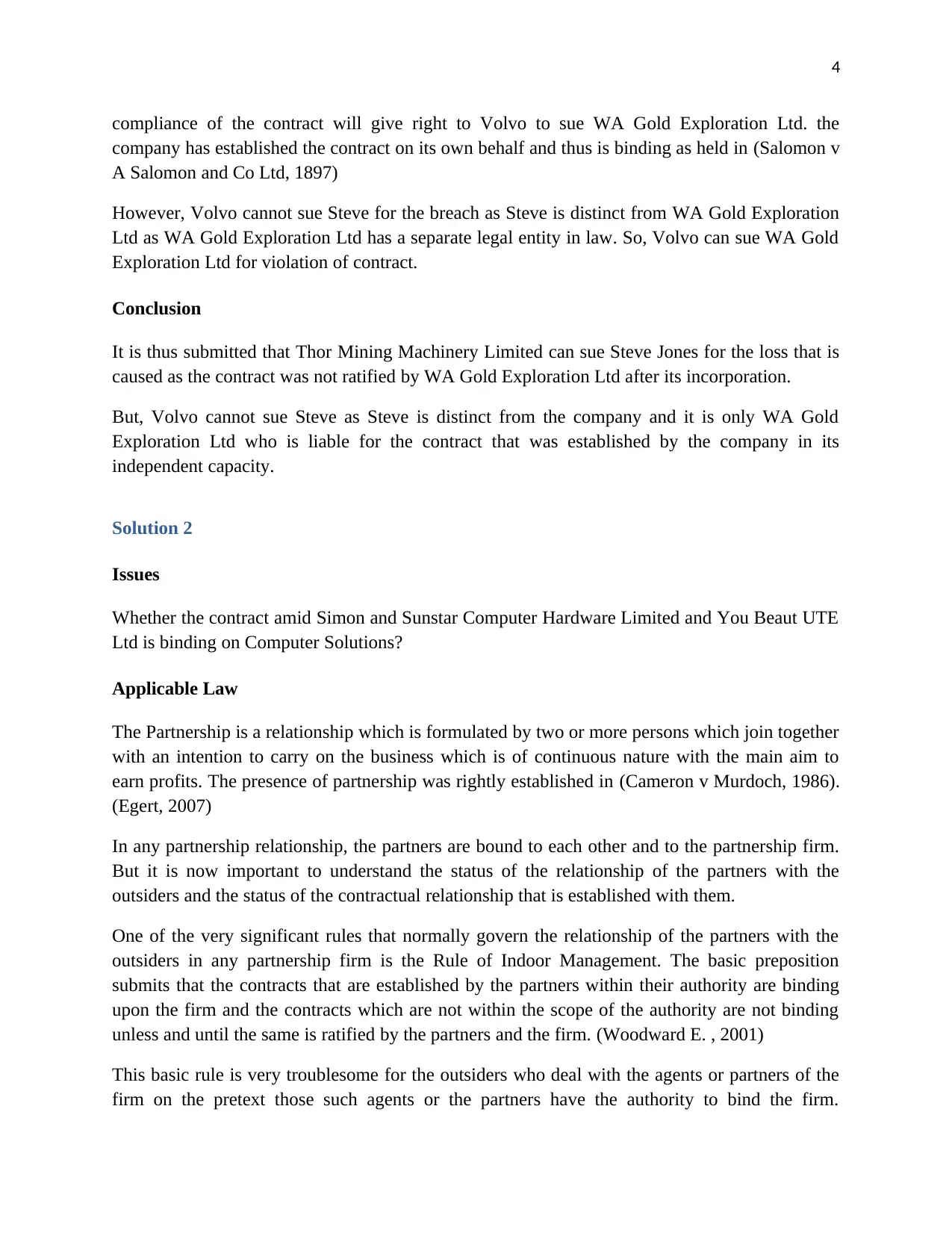
4
compliance of the contract will give right to Volvo to sue WA Gold Exploration Ltd. the
company has established the contract on its own behalf and thus is binding as held in (Salomon v
A Salomon and Co Ltd, 1897)
However, Volvo cannot sue Steve for the breach as Steve is distinct from WA Gold Exploration
Ltd as WA Gold Exploration Ltd has a separate legal entity in law. So, Volvo can sue WA Gold
Exploration Ltd for violation of contract.
Conclusion
It is thus submitted that Thor Mining Machinery Limited can sue Steve Jones for the loss that is
caused as the contract was not ratified by WA Gold Exploration Ltd after its incorporation.
But, Volvo cannot sue Steve as Steve is distinct from the company and it is only WA Gold
Exploration Ltd who is liable for the contract that was established by the company in its
independent capacity.
Solution 2
Issues
Whether the contract amid Simon and Sunstar Computer Hardware Limited and You Beaut UTE
Ltd is binding on Computer Solutions?
Applicable Law
The Partnership is a relationship which is formulated by two or more persons which join together
with an intention to carry on the business which is of continuous nature with the main aim to
earn profits. The presence of partnership was rightly established in (Cameron v Murdoch, 1986).
(Egert, 2007)
In any partnership relationship, the partners are bound to each other and to the partnership firm.
But it is now important to understand the status of the relationship of the partners with the
outsiders and the status of the contractual relationship that is established with them.
One of the very significant rules that normally govern the relationship of the partners with the
outsiders in any partnership firm is the Rule of Indoor Management. The basic preposition
submits that the contracts that are established by the partners within their authority are binding
upon the firm and the contracts which are not within the scope of the authority are not binding
unless and until the same is ratified by the partners and the firm. (Woodward E. , 2001)
This basic rule is very troublesome for the outsiders who deal with the agents or partners of the
firm on the pretext those such agents or the partners have the authority to bind the firm.
compliance of the contract will give right to Volvo to sue WA Gold Exploration Ltd. the
company has established the contract on its own behalf and thus is binding as held in (Salomon v
A Salomon and Co Ltd, 1897)
However, Volvo cannot sue Steve for the breach as Steve is distinct from WA Gold Exploration
Ltd as WA Gold Exploration Ltd has a separate legal entity in law. So, Volvo can sue WA Gold
Exploration Ltd for violation of contract.
Conclusion
It is thus submitted that Thor Mining Machinery Limited can sue Steve Jones for the loss that is
caused as the contract was not ratified by WA Gold Exploration Ltd after its incorporation.
But, Volvo cannot sue Steve as Steve is distinct from the company and it is only WA Gold
Exploration Ltd who is liable for the contract that was established by the company in its
independent capacity.
Solution 2
Issues
Whether the contract amid Simon and Sunstar Computer Hardware Limited and You Beaut UTE
Ltd is binding on Computer Solutions?
Applicable Law
The Partnership is a relationship which is formulated by two or more persons which join together
with an intention to carry on the business which is of continuous nature with the main aim to
earn profits. The presence of partnership was rightly established in (Cameron v Murdoch, 1986).
(Egert, 2007)
In any partnership relationship, the partners are bound to each other and to the partnership firm.
But it is now important to understand the status of the relationship of the partners with the
outsiders and the status of the contractual relationship that is established with them.
One of the very significant rules that normally govern the relationship of the partners with the
outsiders in any partnership firm is the Rule of Indoor Management. The basic preposition
submits that the contracts that are established by the partners within their authority are binding
upon the firm and the contracts which are not within the scope of the authority are not binding
unless and until the same is ratified by the partners and the firm. (Woodward E. , 2001)
This basic rule is very troublesome for the outsiders who deal with the agents or partners of the
firm on the pretext those such agents or the partners have the authority to bind the firm.
Paraphrase This Document
Need a fresh take? Get an instant paraphrase of this document with our AI Paraphraser
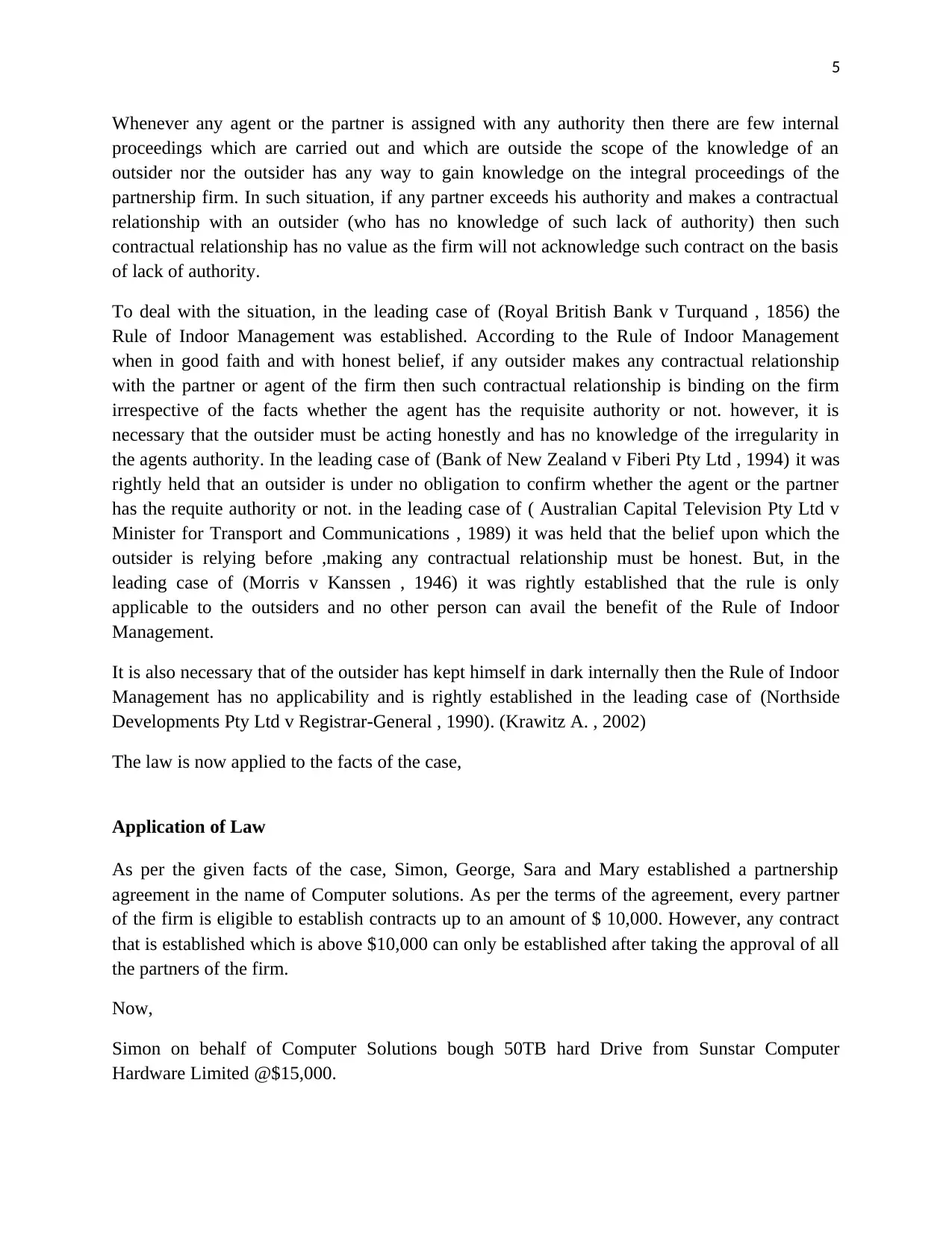
5
Whenever any agent or the partner is assigned with any authority then there are few internal
proceedings which are carried out and which are outside the scope of the knowledge of an
outsider nor the outsider has any way to gain knowledge on the integral proceedings of the
partnership firm. In such situation, if any partner exceeds his authority and makes a contractual
relationship with an outsider (who has no knowledge of such lack of authority) then such
contractual relationship has no value as the firm will not acknowledge such contract on the basis
of lack of authority.
To deal with the situation, in the leading case of (Royal British Bank v Turquand , 1856) the
Rule of Indoor Management was established. According to the Rule of Indoor Management
when in good faith and with honest belief, if any outsider makes any contractual relationship
with the partner or agent of the firm then such contractual relationship is binding on the firm
irrespective of the facts whether the agent has the requisite authority or not. however, it is
necessary that the outsider must be acting honestly and has no knowledge of the irregularity in
the agents authority. In the leading case of (Bank of New Zealand v Fiberi Pty Ltd , 1994) it was
rightly held that an outsider is under no obligation to confirm whether the agent or the partner
has the requite authority or not. in the leading case of ( Australian Capital Television Pty Ltd v
Minister for Transport and Communications , 1989) it was held that the belief upon which the
outsider is relying before ,making any contractual relationship must be honest. But, in the
leading case of (Morris v Kanssen , 1946) it was rightly established that the rule is only
applicable to the outsiders and no other person can avail the benefit of the Rule of Indoor
Management.
It is also necessary that of the outsider has kept himself in dark internally then the Rule of Indoor
Management has no applicability and is rightly established in the leading case of (Northside
Developments Pty Ltd v Registrar-General , 1990). (Krawitz A. , 2002)
The law is now applied to the facts of the case,
Application of Law
As per the given facts of the case, Simon, George, Sara and Mary established a partnership
agreement in the name of Computer solutions. As per the terms of the agreement, every partner
of the firm is eligible to establish contracts up to an amount of $ 10,000. However, any contract
that is established which is above $10,000 can only be established after taking the approval of all
the partners of the firm.
Now,
Simon on behalf of Computer Solutions bough 50TB hard Drive from Sunstar Computer
Hardware Limited @$15,000.
Whenever any agent or the partner is assigned with any authority then there are few internal
proceedings which are carried out and which are outside the scope of the knowledge of an
outsider nor the outsider has any way to gain knowledge on the integral proceedings of the
partnership firm. In such situation, if any partner exceeds his authority and makes a contractual
relationship with an outsider (who has no knowledge of such lack of authority) then such
contractual relationship has no value as the firm will not acknowledge such contract on the basis
of lack of authority.
To deal with the situation, in the leading case of (Royal British Bank v Turquand , 1856) the
Rule of Indoor Management was established. According to the Rule of Indoor Management
when in good faith and with honest belief, if any outsider makes any contractual relationship
with the partner or agent of the firm then such contractual relationship is binding on the firm
irrespective of the facts whether the agent has the requisite authority or not. however, it is
necessary that the outsider must be acting honestly and has no knowledge of the irregularity in
the agents authority. In the leading case of (Bank of New Zealand v Fiberi Pty Ltd , 1994) it was
rightly held that an outsider is under no obligation to confirm whether the agent or the partner
has the requite authority or not. in the leading case of ( Australian Capital Television Pty Ltd v
Minister for Transport and Communications , 1989) it was held that the belief upon which the
outsider is relying before ,making any contractual relationship must be honest. But, in the
leading case of (Morris v Kanssen , 1946) it was rightly established that the rule is only
applicable to the outsiders and no other person can avail the benefit of the Rule of Indoor
Management.
It is also necessary that of the outsider has kept himself in dark internally then the Rule of Indoor
Management has no applicability and is rightly established in the leading case of (Northside
Developments Pty Ltd v Registrar-General , 1990). (Krawitz A. , 2002)
The law is now applied to the facts of the case,
Application of Law
As per the given facts of the case, Simon, George, Sara and Mary established a partnership
agreement in the name of Computer solutions. As per the terms of the agreement, every partner
of the firm is eligible to establish contracts up to an amount of $ 10,000. However, any contract
that is established which is above $10,000 can only be established after taking the approval of all
the partners of the firm.
Now,
Simon on behalf of Computer Solutions bough 50TB hard Drive from Sunstar Computer
Hardware Limited @$15,000.
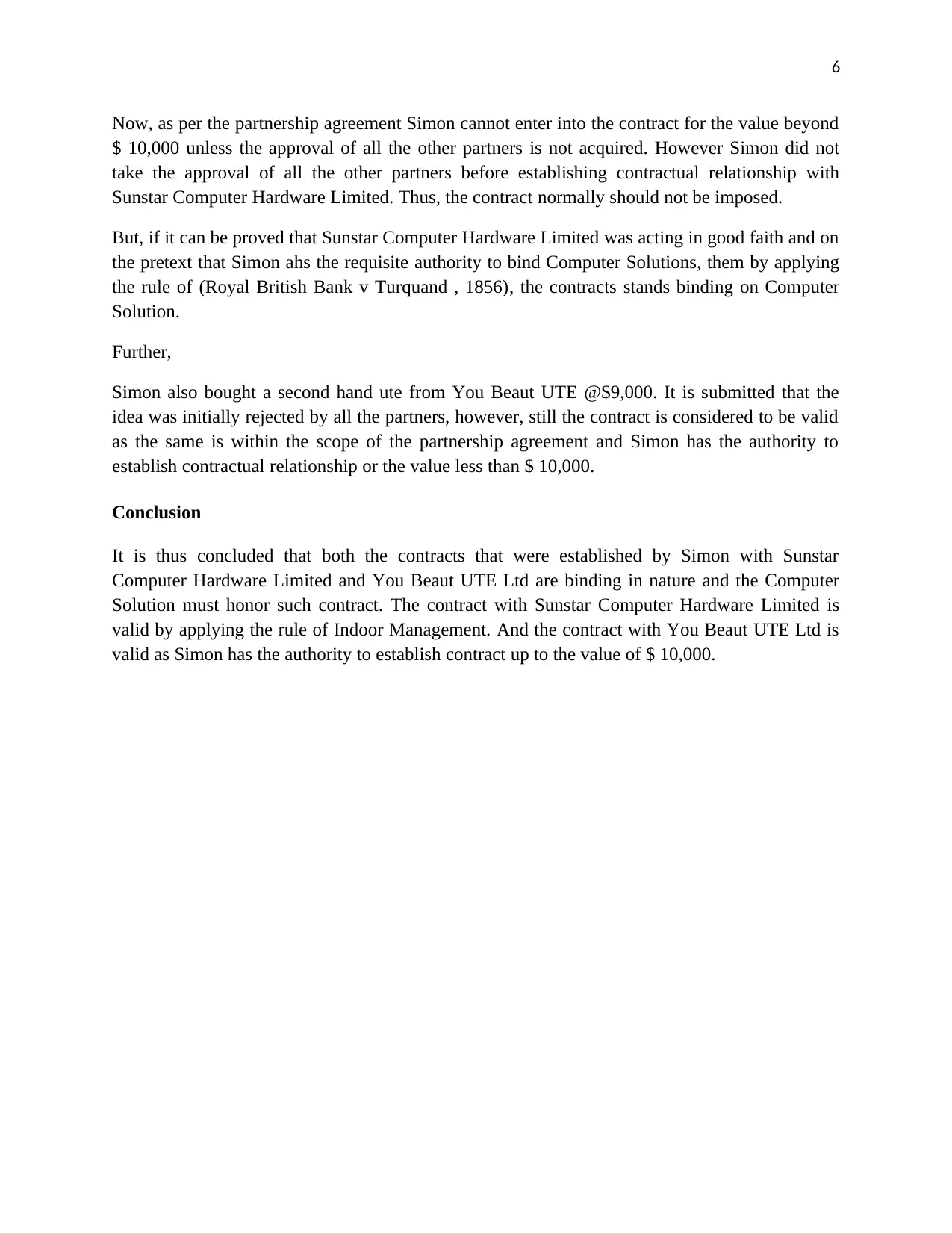
6
Now, as per the partnership agreement Simon cannot enter into the contract for the value beyond
$ 10,000 unless the approval of all the other partners is not acquired. However Simon did not
take the approval of all the other partners before establishing contractual relationship with
Sunstar Computer Hardware Limited. Thus, the contract normally should not be imposed.
But, if it can be proved that Sunstar Computer Hardware Limited was acting in good faith and on
the pretext that Simon ahs the requisite authority to bind Computer Solutions, them by applying
the rule of (Royal British Bank v Turquand , 1856), the contracts stands binding on Computer
Solution.
Further,
Simon also bought a second hand ute from You Beaut UTE @$9,000. It is submitted that the
idea was initially rejected by all the partners, however, still the contract is considered to be valid
as the same is within the scope of the partnership agreement and Simon has the authority to
establish contractual relationship or the value less than $ 10,000.
Conclusion
It is thus concluded that both the contracts that were established by Simon with Sunstar
Computer Hardware Limited and You Beaut UTE Ltd are binding in nature and the Computer
Solution must honor such contract. The contract with Sunstar Computer Hardware Limited is
valid by applying the rule of Indoor Management. And the contract with You Beaut UTE Ltd is
valid as Simon has the authority to establish contract up to the value of $ 10,000.
Now, as per the partnership agreement Simon cannot enter into the contract for the value beyond
$ 10,000 unless the approval of all the other partners is not acquired. However Simon did not
take the approval of all the other partners before establishing contractual relationship with
Sunstar Computer Hardware Limited. Thus, the contract normally should not be imposed.
But, if it can be proved that Sunstar Computer Hardware Limited was acting in good faith and on
the pretext that Simon ahs the requisite authority to bind Computer Solutions, them by applying
the rule of (Royal British Bank v Turquand , 1856), the contracts stands binding on Computer
Solution.
Further,
Simon also bought a second hand ute from You Beaut UTE @$9,000. It is submitted that the
idea was initially rejected by all the partners, however, still the contract is considered to be valid
as the same is within the scope of the partnership agreement and Simon has the authority to
establish contractual relationship or the value less than $ 10,000.
Conclusion
It is thus concluded that both the contracts that were established by Simon with Sunstar
Computer Hardware Limited and You Beaut UTE Ltd are binding in nature and the Computer
Solution must honor such contract. The contract with Sunstar Computer Hardware Limited is
valid by applying the rule of Indoor Management. And the contract with You Beaut UTE Ltd is
valid as Simon has the authority to establish contract up to the value of $ 10,000.
⊘ This is a preview!⊘
Do you want full access?
Subscribe today to unlock all pages.

Trusted by 1+ million students worldwide
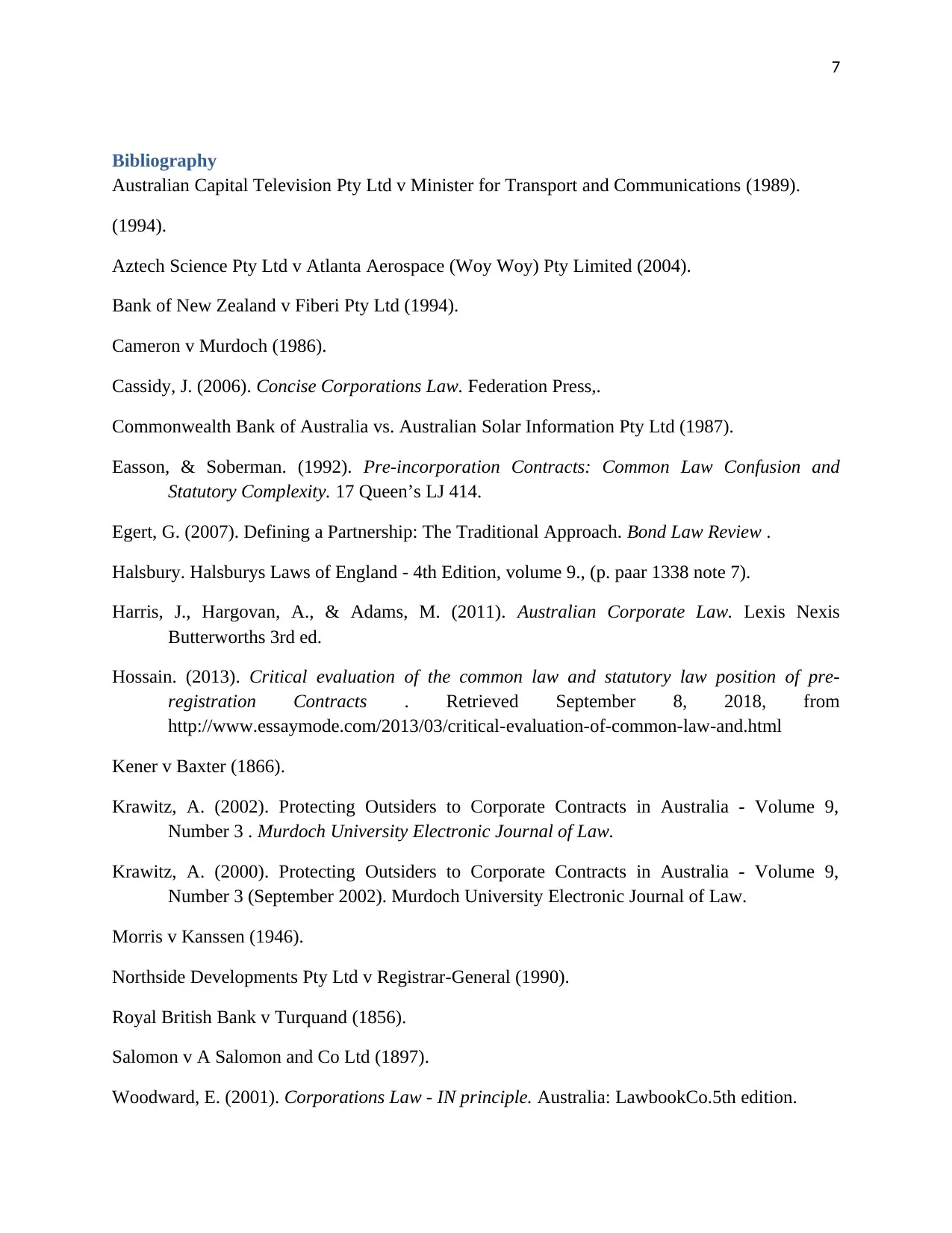
7
Bibliography
Australian Capital Television Pty Ltd v Minister for Transport and Communications (1989).
(1994).
Aztech Science Pty Ltd v Atlanta Aerospace (Woy Woy) Pty Limited (2004).
Bank of New Zealand v Fiberi Pty Ltd (1994).
Cameron v Murdoch (1986).
Cassidy, J. (2006). Concise Corporations Law. Federation Press,.
Commonwealth Bank of Australia vs. Australian Solar Information Pty Ltd (1987).
Easson, & Soberman. (1992). Pre-incorporation Contracts: Common Law Confusion and
Statutory Complexity. 17 Queen’s LJ 414.
Egert, G. (2007). Defining a Partnership: The Traditional Approach. Bond Law Review .
Halsbury. Halsburys Laws of England - 4th Edition, volume 9., (p. paar 1338 note 7).
Harris, J., Hargovan, A., & Adams, M. (2011). Australian Corporate Law. Lexis Nexis
Butterworths 3rd ed.
Hossain. (2013). Critical evaluation of the common law and statutory law position of pre-
registration Contracts . Retrieved September 8, 2018, from
http://www.essaymode.com/2013/03/critical-evaluation-of-common-law-and.html
Kener v Baxter (1866).
Krawitz, A. (2002). Protecting Outsiders to Corporate Contracts in Australia - Volume 9,
Number 3 . Murdoch University Electronic Journal of Law.
Krawitz, A. (2000). Protecting Outsiders to Corporate Contracts in Australia - Volume 9,
Number 3 (September 2002). Murdoch University Electronic Journal of Law.
Morris v Kanssen (1946).
Northside Developments Pty Ltd v Registrar-General (1990).
Royal British Bank v Turquand (1856).
Salomon v A Salomon and Co Ltd (1897).
Woodward, E. (2001). Corporations Law - IN principle. Australia: LawbookCo.5th edition.
Bibliography
Australian Capital Television Pty Ltd v Minister for Transport and Communications (1989).
(1994).
Aztech Science Pty Ltd v Atlanta Aerospace (Woy Woy) Pty Limited (2004).
Bank of New Zealand v Fiberi Pty Ltd (1994).
Cameron v Murdoch (1986).
Cassidy, J. (2006). Concise Corporations Law. Federation Press,.
Commonwealth Bank of Australia vs. Australian Solar Information Pty Ltd (1987).
Easson, & Soberman. (1992). Pre-incorporation Contracts: Common Law Confusion and
Statutory Complexity. 17 Queen’s LJ 414.
Egert, G. (2007). Defining a Partnership: The Traditional Approach. Bond Law Review .
Halsbury. Halsburys Laws of England - 4th Edition, volume 9., (p. paar 1338 note 7).
Harris, J., Hargovan, A., & Adams, M. (2011). Australian Corporate Law. Lexis Nexis
Butterworths 3rd ed.
Hossain. (2013). Critical evaluation of the common law and statutory law position of pre-
registration Contracts . Retrieved September 8, 2018, from
http://www.essaymode.com/2013/03/critical-evaluation-of-common-law-and.html
Kener v Baxter (1866).
Krawitz, A. (2002). Protecting Outsiders to Corporate Contracts in Australia - Volume 9,
Number 3 . Murdoch University Electronic Journal of Law.
Krawitz, A. (2000). Protecting Outsiders to Corporate Contracts in Australia - Volume 9,
Number 3 (September 2002). Murdoch University Electronic Journal of Law.
Morris v Kanssen (1946).
Northside Developments Pty Ltd v Registrar-General (1990).
Royal British Bank v Turquand (1856).
Salomon v A Salomon and Co Ltd (1897).
Woodward, E. (2001). Corporations Law - IN principle. Australia: LawbookCo.5th edition.
Paraphrase This Document
Need a fresh take? Get an instant paraphrase of this document with our AI Paraphraser

8
Woodward, E. (2001). Corporations Law - IN principle, 5th edition. (p. 113). Australia:
LawbookCo.
Woodward, E. (2001). Corporations Law - IN principle, 5th edition. (p. 113). Australia:
LawbookCo.
1 out of 8
Related Documents
Your All-in-One AI-Powered Toolkit for Academic Success.
+13062052269
info@desklib.com
Available 24*7 on WhatsApp / Email
![[object Object]](/_next/static/media/star-bottom.7253800d.svg)
Unlock your academic potential
Copyright © 2020–2026 A2Z Services. All Rights Reserved. Developed and managed by ZUCOL.



